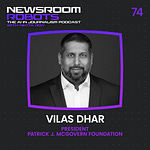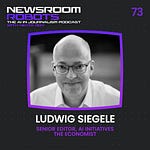📢 I'm excited to announce the launch of the Newsroom Robots Academy, offering short online courses designed to introduce you to generative AI, complete with industry-specific insights.
I will co-teach these courses alongside Jeremy Caplan, author of Wonder Tools and Director of Teaching and Learning at the Craig Newmark Graduate School of Journalism at the City University of New York.
Upskilling has become more crucial than ever for us in the media industry. Through the courses offered at the Newsroom Robots Academy, you'll learn to leverage the capabilities of generative AI like ChatGPT in your work.
Sign up now to be among the first to know when course registration opens.
When Craig Newmark, the founder of Craigslist, considered studying artificial intelligence in the early 1970s, the field was still in its infancy, and job prospects in AI were virtually nonexistent. Despite his interest, the practicalities of the era led him to pursue a career in systems engineering. Little did he know that, 50 years later, AI would transform the internet and our lives in ways no one could have imagined.
I recently had the pleasure of speaking with Craig about his decades-long relationship with technology and his vision for ethically integrating AI into journalism. Our conversation covered a wide range of topics, from his early fascination with AI to the rapid evolution of large language models to his use of philanthropy to shape the technologies to enrich journalistic practices.
Craig traces his initial interest in AI back to reading one too many sci-fi novels as a college student. He recognized natural language processing as a potential pathway to mimicking human cognition and consciousness. But realizing the field was still a long way from this goal, Craig pivoted to software engineering, where he made his mark by founding the classified ads site Craigslist.
Yet even as Craigslist grew over 25 years into an indispensable internet platform, Craig admits he took his "eye off the ball" on AI. The field's recent explosive advances with large language models like ChatGPT caught him by surprise - both thrilling him with their capabilities and concerning him about their limitations.
While Craig sees the practical promise of AI for tasks like customer service, he also cautions about the technology's unsolved problems. This includes issues like systems trained on unreliable data that could "lie" to users. He advocates adopting standards around transparency and evaluating model trustworthiness - taking inspiration from Wikipedia's sorting of reputable versus questionable sources.
We also discussed the essential role of journalists in responsibly reporting on and even utilizing AI tools.
Craig strongly backs supporting rigorous training programs like CUNY's new AI journalism lab that equips journalists with AI literacy. He reasons that quality journalism is the "immune system of democracy."
Craig remains hopeful yet realistic about emerging technologies. He knows progress rarely moves as quickly as Silicon Valley hype suggests, but milestone achievements can still surprise even tech veterans like himself.
With AI's pace of change unlikely to slow, Craig sees an urgent need for multidisciplinary input and transparent communication to steer innovations toward the greater social good.
Craig is a visionary whose profound contributions have shaped the landscape of digital platforms and supported the pillars of journalism.
As the founder of Craigslist, he revolutionized the classified ads sector and transformed how people buy, sell, and connect within their local communities.
Beyond his impact on the internet's landscape, Craig is a dedicated philanthropist, notably through the Craig Newmark Philanthropies, where he has become a beacon of support for the work of journalists.
His philanthropic journey is marked by significant contributions to some of the leading journalism schools, including the City University of New York's Graduate School of Journalism, aiming for a future where education in journalism is accessible to all, free of tuition.
Craig's generosity has been instrumental in establishing the Center for Journalism Ethics and Security at Columbia University.
His vision for a well-informed public has also led to supporting the University of Washington's Center for an Informed Public addressing the critical issues of mis- and disinformation.
Craig Newmark Philanthropies has contributed to Harvard University's Berkman Klein Center for Internet & Society, which supported the launch of a three-year initiative called the Institute for Rebooting Social Media.
Craig has contributed to several other universities, focusing on initiatives that support journalism, cybersecurity, public service for veterans, and the digital information ecosystem.
🎧 Listen to the full conversation available now on Apple, Spotify, Google, and other major podcast platforms.










